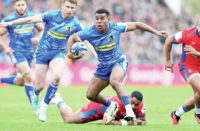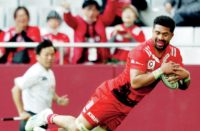 Harlquins deserve a round of applause. I like the way they play the game. Being prepared to play an attacking game – like the Chiefs in Super 15 and Leinster in Europe – is a brave way of playing in the Premiership. They had a wobble two-thirds of the way through last season's campaign, but they had the self-belief to win through and take the title for the first time. I can recall from my own career with Bath that there are some games that give you that belief – and Harlequins away wins against Toulouse and against Saracens at Wembley were matches of that significance. They gave Chris Robshaw and his team the confidence that they could beat Leicester in the Twickenham final.
Harlquins deserve a round of applause. I like the way they play the game. Being prepared to play an attacking game – like the Chiefs in Super 15 and Leinster in Europe – is a brave way of playing in the Premiership. They had a wobble two-thirds of the way through last season's campaign, but they had the self-belief to win through and take the title for the first time. I can recall from my own career with Bath that there are some games that give you that belief – and Harlequins away wins against Toulouse and against Saracens at Wembley were matches of that significance. They gave Chris Robshaw and his team the confidence that they could beat Leicester in the Twickenham final.
However, Leicester are the only club in England that have built a dynasty, because their span of success has lasted for 30 years. Every club in England would like to create an environment as successful as Leicester's, but in many cases it is wishful thinking. Leicester's success stretches from the amateur era – with players like Peter Wheeler, Clive Woodward, Les Cusworth, Paul Dodge and Dusty Hare – through to the professional game of today. They have been successful in winning domestic trophies and leagues ever since I was in the Bath Colts, and that is what makes them different.
Bath were successful for a decade during my time there, and Wasps had five years of dominance from 2002-2007, but Leicester have always been challenging even when they weren't winning trophies. Since then, Saracens have had a brief sip of success with one title, and Northampton have been close but not quite got there. What separates Leicester from the other clubs is their deep culture of success, and expectation of success, handed down from one generation to the next.
Can Harlequins create a similar dynasty? There is no doubt that they have evolved, because my first impression of them as a player was a bunch of Yuppies with great kit, but who weren't very good. Then, with world class players like Will Carling, Peter Winterbottom, Brian Moore and Troy Coker, they got better and became the Hollywood club of English rugby – but they still struggled to win the big prizes.
It's taken them sometime to shake that image, but with Mark Evans coming from Saracens as director of rugby, and then chief executive, and Tony Copsey joining him as head of marketing, they started to change the culture and build the club from the bottom up. As a result, they have been successful in replacing not only players, but administrators, with both Evans and Copsey moving on. However, their legacy is evident with a very good stadium that is usually full.
Dean Richards was also crucial in helping to build the new Harlequins, because his no-nonsense approach and straight- talking was essential to the cultural change that needed to take place on the playing side. He tends to tell things as they are, and he would have told the players in his squad how much harder they had to work if they wanted to be successful.
The club managed the difficult period around Bloodgate as well as could be expected, keeping continuity on the coaching front through John Kingston, and then bringing in Conor O'Shea to fill the role vacated by Richards.
On the pitch Robshaw has been a fantastic leader, although it will be interesting to see how O'Shea handles selection this season, especially in integrating Luke Wallace, because Harlequins need a No.7. Robshaw is a very good club back-rower, who is learning all the time, and he was voted Premiership Player of the Year because his contribution in terms of workrate is immense. That's why he's such a good captain – but it is clear that he is not an international openside. He is the same size as Richie McCaw, but he is not as fast, and learning the No.7 role and improving speed is tough at his age (26).
Whatever happens in the back-row, Harlequins have a lot of the building blocks in place. With good administration, direction, coaches and players, the culture seems well set. But they cannot let anyone or anything knock the club as a whole off-track. So, if big figures leave, for whatever reason, they need to keep producing, or recruiting, people who can step in.
This season every game will be almost like a cup final, because now they are champions everyone will want to beat them. My feeling is that Harlequins are still hungry for success, and they have the bonus of having very good players, some of them world class, in every area of the pitch. They have a good young prop in Joe Marler, an impressive lock in George Robson, a driving force in Robshaw and Maurie Fa'asavalu in the back-row, world class half-backs in Danny Care and Nicky Evans, while in the back three Mike Brown is an international calibre full-back. Even better, none of these guys are old.
The Harlequins backline is strong in every position, with the centre pairing of Jordan Turner-Hall and George Lowe among the top five centres in England. Evans at fly-half is the key to success in the short-term, and the only issue will be finding someone of similar quality to replace the Kiwi, who turns 32 next month, in two or three years time.
The only blip last season was that Quins loss to Connacht in the Heineken Cup which was short of the standard required, and they should have progressed further in Europe last season. Expectation this season will be higher since Quins are joined in one of the weaker pools by Biarritz, with Connacht and Zebre, the new Italian outfit, also involved. Putting right what they got wrong last time to at least make the last eight will be high on the agenda at The Stoop.
Do Quins have the depth in their squad to do it? Well, Wasps and Leicester managed to fight on both fronts successfully – and that is what made them great. Quins will also require a little luck because it is the quality of your squad, not the size, that counts. If you took the top six players out of every club they would struggle – so avoiding a long injury list is very important.
English clubs like Harlequins cannot rest their top players as much as the Irish, Welsh and Scots, while the size of the French salary cap also enables them to rest star players more regularly. That is a fact of life, but it is offset by the fact that success breeds success. Harlequins have a strong squad and are attracting top level players. They also have good facilities at The Stoop, and are attracting big crowds in the south-west of London – what more could you ask for.
They will be top four in the Premiership without any problem, but a dynasty is created by winning and putting trophies in the cabinet, and the only way you establish that is by players knowing the high standards required to deliver. That is the pressure that exists all the time at a club like Leicester. Whether Harlequins will retain the title is difficult to predict – but if they are to build their own dynasty they will have to start winning back-to-back championships.


























